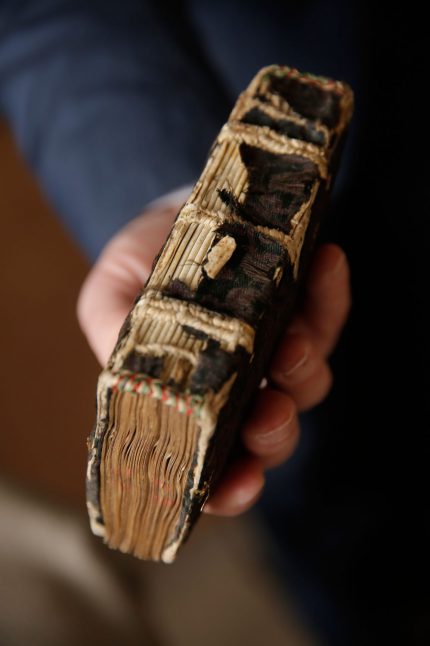Newberry Consort excavates 15th-century songs with mixed results

Early music ensembles do not typically have the opportunity to do premieres. The Newberry Consort’s program Friday night at Ruggles Hall was an exception to that rule.
Their program—entitled “What’s Old is New”—presented music from the Leuven Chansonnier, a recently discovered 15th-century songbook containing 49 songs in French and Latin, 12 of which were previously unknown. As far as anyone can tell, Friday was the Chicago premiere of some of these 500-year-old works, and the concert as a whole intelligently engaged the paradox that something so old can indeed be “new.”
The Leuven Chansonnier—so named by virtue of where it is currently housed in Belgium—is a diminutive but elegantly bound volume, its pages about the size of a 3×5 index card. (A digitized version can be found here.) Such documents were almost certainly not intended for performance purposes, but rather—according to the evening’s curator and early music polymath Debra Nagy—were more like the 15th century’s equivalent of today’s personal playlists.
With one exception, the songs are all written in three parts, but without indications as to voice or instrument. As is often the case with Newberry programs, the ensemble members clearly did considerable work to render the songs performable in the first place.
The 80-minute program combined six original songs from the Leuven manuscript with six previously known 15th-century songs. The Consort organized the selections to present a narrative arc, telling an imagined yet familiar tale of courtly love: “The Lover—They meet—He wishes to serve—She responds—The Feast—They must separate—Time passes—He hears nothing—A misunderstanding—She is dismayed—Love’s Slavery—New Hope.” This was an astute choice as songs of the period can sound quite similar to modern ears, and the storyline gave momentum to the evening.
A consistent feature of Newberry programs has been the compelling multimedia work of Shawn Keener, and her contribution Friday night was no exception. Visual projections accompanied each selection, providing both supertitles and images taken from an ornate edition of Roman de la Rose (c.1475) that convincingly portrayed the story of the imagined lovers’ tribulations.
Musically the evening proved more of a mixed bag. The instrumental cadre consisted of Newberry founder David Douglass and Allison Monroe on vielles, lutenist and Juilliard faculty Charles Weaver, Nagy on lap harp and recorder, and Charles Metz on organetto. Nagy and Weaver’s contributions were elegant and assured, but too often the ensemble sounded tentative and even clunky at times.
Whatever this music may have sounded like centuries ago, one can be certain it was intended to sound more appealing and consistently coordinated. The instruments in question all attack notes quite differently—the plucked lute more immediately than the bowed vielle, for instance—and the Consort had ensemble difficulties Friday night. The joviality of instrumental dances that made up “The Feast” portion of the program was amply projected though.
Vocally things were generally more successful. (For much of the evening the singers and instrumentalists performed separately.) Tenor Jason McStoots and bass Daniel Fridley grounded the vocal portions, singing idiomatically and with inviting timbres throughout. Nagy is herself possessed of a comely mezzo that she lent to several songs, and Weaver set his lute down to give occasional but solid renditions of baritone lines. Soprano Ellen Hargis was a capable soloist, particularly in Binchois’ dolorous Comme femme desconfortée (the “She is dismayed” portion), though her fast, narrow vibrato seemed less suited to the Renaissance fare.
In the good news department, the Newberry Consort has acquired a new organetto. This is a welcome addition to their instrumental collection, as the one heard in last year’s Valentine’s Day program, sounded atrocious. By contrast, the new instrument from Wolkenstayn Orgelbau in Kötz, Germany is well-tuned with even tones across its registers. Charles Metz both subsidized the instrument’s purchase and performed on it Friday, each a laudable contribution.
“What’s Old is New: The Leuven Chansonnier” will be repeated 8 p.m. Saturday at the University of Chicago’s Logan Center for the Arts, and 3 p.m. Sunday at Northwestern University’s Galvin Recital Hall in Evanston. newberryconsort.org
Posted in Uncategorized




